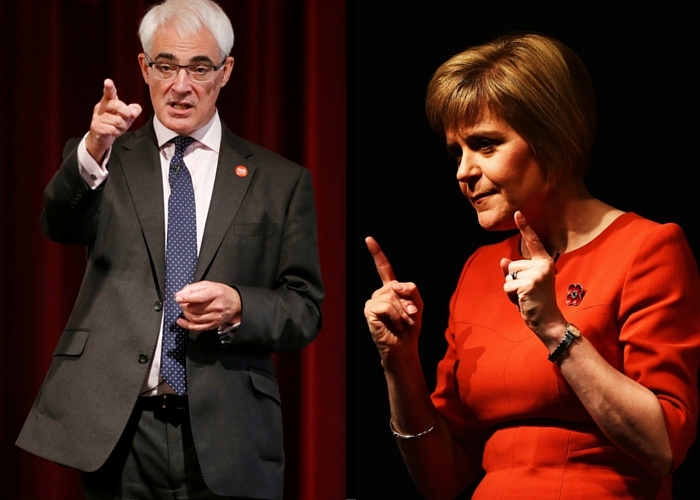
NEARLY a quarter of Scots fell out with a friend or family member during the independence referendum campaign.
Just days before the first anniversary of the historic vote, new polling by The Sunday Post reveals the impact it had on the nation.
Our survey shows almost half of the electorate thought the referendum, with its record 85% turnout, was good for the country.
But 23% admit falling out with those closest to them during the campaign.
Of those who admitted to fall outs, 27% said their relationship with a friend or family member had been permanently damaged as a result.
Alistair Darling, who led Better Together, yesterday claimed the referendum had left “corrosive” divisions.
But Nicola Sturgeon rubbished these allegations saying the vote had created an “energised and enthused nation”.
The Survation poll conducted last week asked 1,000 people if they had fallen out with a friend or family member over Scottish independence during the referendum campaign.
A total of 23% said yes, while the majority 77% said no.
A second question in the poll found that 48% of respondents thought holding the referendum was good for Scotland, 27 % thought the crunch vote had been bad for the country, while the rest were not sure or thought it was neither good nor bad.
Men and those who voted No were more likely to have had arguments with friends and family, according to the poll.
A separate YouGov poll published yesterday has put the pendulum back in favour of the Union, with 52% saying they would vote No and 48% voting Yes if a referendum was held tomorrow.
 Getty Images
Getty Images
Miss Sturgeon yesterday focused on the positives from the referendum, highlighting the bumper turnout in the General Election which followed on from the 85% of Scots who voted in the independence poll.
She said: “Last September’s independence referendum was a historic day for Scotland. And while it did not deliver the result that I and so many others worked so hard to achieve, its legacy has been an overwhelmingly positive one for our nation.
“The final stages of the referendum campaign 12 months ago meant that every part of Scotland was a hotbed of informed, lively political discussion.
“It meant that we had probably the most politically engaged and attuned electorate anywhere in the developed world at that moment.
“The referendum sparked an unprecedented level of political engagement in Scotland, with the highest turnout of any UK ballot for more than a century.
“It brought into politics people, who in some cases had not been involved in decades, or ever, and it enabled people to have their say
“It was a triumph for democracy and participation, not least from 16 and 17-year-olds, more than 100,000 of whom grasped with both hands the opportunity to vote for the first time.
“The referendum’s enduring legacy is an energised and enthused nation, and we saw further evidence of that with the turnout in Scotland at the recent UK General Election.”
However, former Chancellor Mr Darling said it had had a negative impact. He said he had come across divisions among friends and families, with people “saying things to each other that I would have thought unbelievable”.
“I think that it is corrosive,” he added.
“It won’t go away this is not something you can easily fix and it’s almost being encouraged by the Nationalists this idea that if you’re not for them you’re against Scotland.”
 Getty Images
Getty Images
Speaking in a documentary to be screened on STV tomorrow night, he added: “Half the population didn’t vote for them and a country that is divided from top to bottom where you’ve got these divisions which you do see day in day out it is very, very, very bad for Scotland.”
Meanwhile, Alex Salmond has raised the prospect of the renewal of Trident being justification for the Scottish Government calling another referendum.
The former First Minister said there were “at least four material circumstances bubbling away” which could force a fresh poll.
Mr Salmond has already cited a refusal to deliver on “the vow” of more extensive powers for Holyrood, the threat of Scotland being pulled out of the European Union against its will and “austerity to the max”.
Asked if Trident renewal might be another trigger, Mr Salmond said: “There are four issues, any one of which and a combination of them most certainly could provide a change in material circumstances, which both identifies what Nicola (Sturgeon) has been talking about and
would belie my (once in a generation) forecast of the timescale for a constitutional referendum.”
He added: “Lots of people are opposed to Trident.
“It’s in the SNP’s DNA.”
However, a YouGov poll published yesterday found 53% of Scots supported the retention of nuclear weapons, with 24% backing Trident’s replacement with an equally powerful weapon, and 29% backing it with a cheaper, less powerful weapon.
Just over one-third, 37% said the UK should give it up completely.

Enjoy the convenience of having The Sunday Post delivered as a digital ePaper straight to your smartphone, tablet or computer.
Subscribe for only £5.49 a month and enjoy all the benefits of the printed paper as a digital replica.
Subscribe